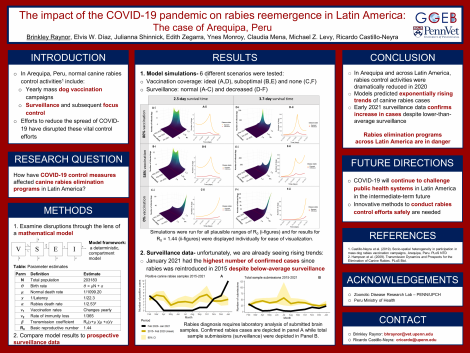Brinkley Raynor
The impact of COVID-19 control measures on rabies re-emergence in Latin America
Abstract
The global burden of COVID-19 goes beyond those who have contracted SARS-CoV-2 and suffered severe or fatal outcomes. One of the unknown costs of the COVID-19 pandemic is the burden of other diseases dismissed to handle the more pressing concern of a pandemic. Worldwide, preventative care has been postponed, vaccines schedules disrupted, and surveillance efforts suspended. One example is rabies in Latin America, a disease that was on the path to elimination through constant mass dog vaccination and surveillance. As all public health resources have been poured into COVID-19 control, rabies control programs are just one among countless to be put on hold. We constructed a compartment model to estimate the effects of disruptions caused by COVID-19 on rabies control programs using data from Arequipa, Peru. The model was parameterized from longitudinal field survey data collected over 4 years and fit using epidemic data. We simulated a decreased rabies vaccination coverage in the dog population and a decreased surveillance effort for rabid dogs. We found that within months, the canine rabies case load was predicted to rise exponentially. Unfortunately, in Peru, preliminary surveillance data from early 2021 corroborate the model findings. The full extent of the impact of COVID-19 may not be fully realized for several years as old diseases previously under control begin to surge. With COVID-19 remaining a pressing problem in the medium to short-term future, public health groups should investigate innovative solutions for maintaining public health control programs even during a pandemic.
Keywords
COVID-19, mass vaccination, mathematical model, One Health, rabies, SARS-CoV-2, zoonosesCommenting is now closed.
About Us
To understand health and disease today, we need new thinking and novel science —the kind we create when multiple disciplines work together from the ground up. That is why this department has put forward a bold vision in population-health science: a single academic home for biostatistics, epidemiology and informatics.
© 2023 Trustees of the University of Pennsylvania. All rights reserved.. | Disclaimer




Comments